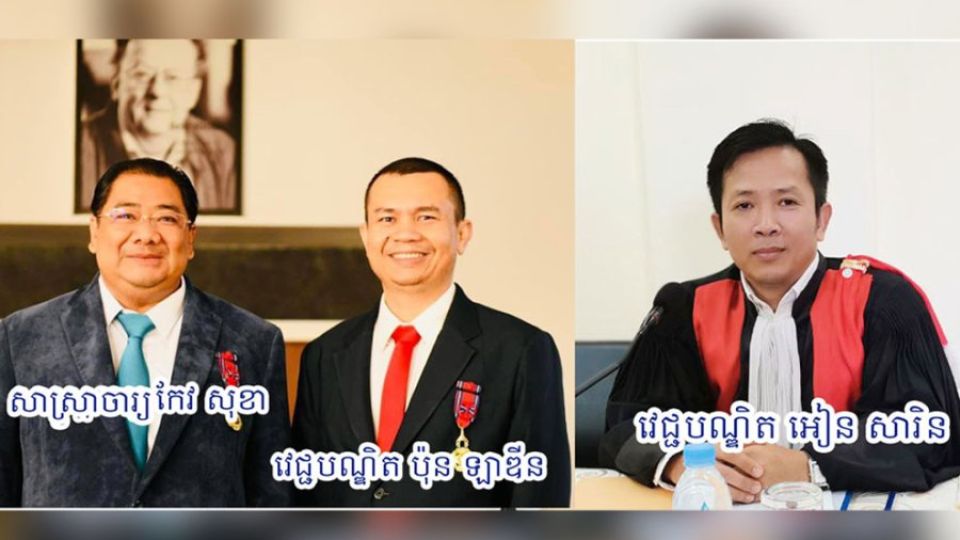November 20, 2023
PHNOM PENH – In a surprising turn of events, a baby in Battambang challenges norms, arriving as asymmetric conjoined twins. With four upper limbs, four lower limbs, and two penises, the infant’s birth presents a medical puzzle, propelling a unique journey through transformative surgeries.
Saing Thim, a 32-year-old from Santepheap village, O’Kandol commune, Sampov Loun district, welcomed her fifth son on July 15. Just two days later, recognising the uniqueness of the infant’s condition, he was transferred to Jayavarman VII Hospital in Siem Reap from a local referral hospital.
Facing bloating issues due to a small anus, the newborn struggled with basic bodily functions.
“The physician initially assessed it as a single, normal pregnancy, but my neighbours speculated about twins because of my enlarged belly,” Thim recounts.
Despite the initial surprise, medical professionals reassured her and set in motion a series of transformative surgeries. Operating on a condition never seen before in their hospital, a dedicated team led by Keo Sokha, Pon Ladin and Ean Sarin undertook the challenging task.
“This is an uncommon medical condition we’ve not encountered in our hospital. Consequently, the surgery involves heightened risk due to the absence of advanced imaging equipment like ultrasound, CT scanners, MRI and notably, the expertise of anaesthesiologists and neonatologists,” general surgeon Keo Sokha tells The Post.
“Prior to surgery, we conducted blood tests and utilised diagnostic imaging tools to establish precise objectives for the procedure. Moreover, it was crucial to ensure the parents fully understood their child’s condition,” says Sokha.
The initial surgery focused on removing one pair of upper limbs, promising enhanced mobility and comfort. Subsequent phases included a colostomy for temporary relief, removal of one pair of lower limbs to refine mobility and a final surgery addressing the pubis bone, each a step towards the infant’s transformation.
In this unprecedented medical journey, the team’s determination and precision played a pivotal role, offering hope and healing to the child and his family.
Homecoming triumph
“Given the complexity of the condition, which involves the digestive system, blood vessels and bones, collaboration among specialists is essential to ensure high-quality surgery. This will be our first time performing such a procedure,” says Sokha.
After surgery, the infant’s condition saw a remarkable improvement of nearly 70 per cent, paving the way for a brighter future. Returning home on November 8 with his parents, this homecoming became a testament to both human resilience and the unwavering dedication of the medical team.
“At this stage, caring for the baby presents challenges, such as managing a colostomy and urination difficulties, which we plan to address with further interventions in one to two years. Nonetheless, the prognosis is expected to improve significantly with additional surgeries,” the doctor says.
Over the next three months, the baby will need another operation to remove the excess pelvis, and the final surgery will be on the anus and genitals, according to Thim.
All treatments at Jayavarman VII Hospital are provided free of charge, reflecting the institution’s commitment to accessible healthcare.
Yay Chantana, the hospital director, highlights the ongoing support provided to the family and expresses gratitude to the dedicated surgical team and supporting organisations.
“The hospital provides daily funding for three months of hospitalisation to support the family. The hospital will also continue to monitor the child’s growth,” he tells The Post.
Charitable contributions from the Kantha Bopha Foundation of Switzerland, along with the Cambodia Kantha Bopha Foundation, played a vital role in making this life-altering surgery possible.
The child’s mother expresses her gratitude, highlighting the life-changing impact these organisations have had on her child’s chance at life.
“I’m unaware of any Cambodian doctor capable of conducting such procedures, and financially, I lack the means. Jayavarman VII Hospital is the reason my child has a shot at life,” she states.
“Upon learning about the surgery, I experienced a mix of joy and concern for my baby’s safety. Yet, the doctors assured me, alleviating my worries through thorough discussions about the procedures,” she recalls.
Currently, the baby is in good health, eagerly awaiting the final two surgeries to complete this transformative journey.
“These instances underscore the significance of promoting public awareness regarding the necessity of routine prenatal check-ups and health screenings for expectant women,” Sokha emphasises.


